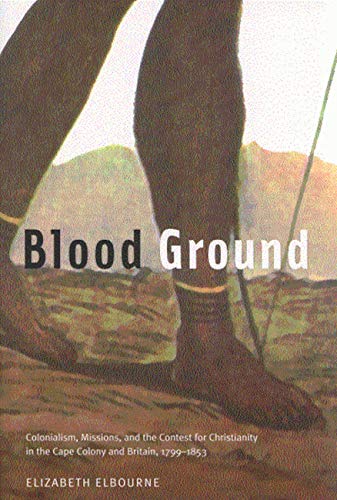Verwandte Artikel zu Blood Ground: Colonialism, Missions, and the Contest...
Blood Ground: Colonialism, Missions, and the Contest for Christianity in the Caoe Colony and Britain, 1799-1853 (Volume 249) (McGill-Queen’s Studies in the Hist of Re) - Hardcover

Críticas
"This is an outstanding work of careful scholarship ... Elbourne demonstrates a clear mastery of archival and secondary sources while drawing widely and deftly on the best that contemporary historical forms have to offer. The result is a richly-textured book that affords us a balanced work of synthesis." James Greenlee, co-author of Good Citizens: British Missionaries and Imperial States, 1870-1918
Reseña del editor
Blood Ground traces the transition from religion to race as the basis for policing the boundaries of the "white" community. Elbourne suggests broader shifts in the relationship of missions to colonialism B as the British movement became less internationalist, more respectable, and more emblematic of the British imperial project B and shows that it is symptomatic that many Christian Khoekhoe ultimately rebelled against the colony. Missionaries across the white settler empire brokered bargains B rights in exchange for cultural change, for example B that brought Aboriginal peoples within the aegis of empire but, ultimately, were only partially and ambiguously fulfilled.
„Über diesen Titel“ kann sich auf eine andere Ausgabe dieses Titels beziehen.
- VerlagMcGill-Queen's University Press
- Erscheinungsdatum2002
- ISBN 10 0773522298
- ISBN 13 9780773522299
- EinbandTapa dura
- SpracheEnglisch
- Anzahl der Seiten532
EUR 4,38 für den Versand von Kanada nach USA
Versandziele, Kosten & DauerSuchergebnisse für Blood Ground: Colonialism, Missions, and the Contest...
Blood Ground: Colonialism, Missions, and the Contest for Christianity in the Cape Colony and Britain, 1799-1853
Anbieter: Atticus Books, Toronto, ON, Kanada
Hardcover. Zustand: Very Good. No Jacket. 1st Edition. List price Amazon - $95.00. "In "Blood Ground", Elizabeth Elbourne looks at the relationship between the Khoekhoe, the British empire, and the London Missionary Society in the early nineteenth century, a time of intense conflict in which different groups competed to mobilize Christianity for their own political ends. She explores the social history of the early missionary movement as well the political impact of British evangelicals, arguing that religious change in southern Africa can only be understood in the material context of ethnic conflict and bitter struggles over land and labour. In doing so, she reintegrates the history of religion into the mainstream historical narrative of South Africa, offering a view of Christianity not as a monolithic system but as a language subject to interpretation and highly politicized conflicts over meaning."Blood Ground" traces the transition from religion to race as the basis for policing the boundaries of the "white" community. Elbourne suggests broader shifts in the relationship of missions to colonialism - as the British movement became less internationalist, more respectable, and more emblematic of the British imperial project - and shows that it is symptomatic that many Christian Khoekhoe ultimately rebelled against the colony. Missionaries across the white settler empire brokered bargains - rights in exchange for cultural change, for example - that brought Aboriginal peoples within the aegis of empire but, ultimately, were only partially and ambiguously fulfilled." (Publisher). Artikel-Nr. H5825Q
Anzahl: 1 verfügbar

